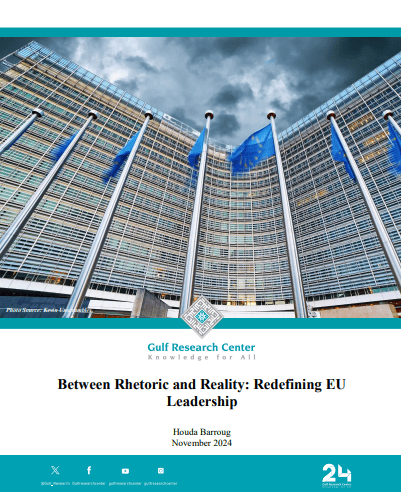
The EU is at a critical junction, faced with a slew of crises that jeopardize its prosperity, continuity, unity, and global influence. For years, the notion that the EU needs to take matters into its own hands has persisted among politicians, think tanks, and media outlets. However, as of the end of 2024, this attitude remained mostly unresolved, with meaningful action notably absent. The pressing questions now are not just when the EU will take significant action, but also how it will do so in a way that solves the complicated web of difficulties it faces.
Over the past five years, the EU has been met with a series of challenges that have put its resilience and unity to the test. The ongoing war in Ukraine, sparked by Russia's aggression, has highlighted flaws in Europe's security infrastructure. The COVID-19 pandemic exposed flaws in public health systems and economic structures across member countries, while the growth of far-right and antiEU sentiment has undermined the very foundation of European unity and credibility. Despite all this, responses by EU institutions have frequently been slow, fragmented, and insufficient, highlighting a gap between the urgency and severity of the situation and the pace of EU action.
This lethargy is not from a lack of awareness. EU leaders and citizens realize the need for reform. However, the Union's complex decision-making processes, differing national interests, and proclivity for consensus-building frequently result in watered-down legislation that fails to address issues fully. The time for platitudes and half-measures is therefore long gone. The EU is at a crossroads, with its global relevance and efficacy on the line.
Moving forward, the EU is in dire need to effectively reassess and depart from its current approach to crisis management and long-term strategic planning. The Union's strength lies in its collective resources and common values, yet it frequently fails to exploit these advantages effectively. A fundamental adjustment in mindset is required, one that values immediate, decisive action above lengthy discussion.
In terms of military and security, the EU must go beyond rhetoric and develop a fully integrated European defense plan. This goes beyond simply raising military budgets; it necessitates a rethinking of how member nations collaborate on security issues. For now, the framework remains fragmented and reactive, making it unable to deal with developing challenges like Russia's involvement in Ukraine. The suggested establishment of a rapid reaction force, while promising, poses substantial challenges. Member states' unwillingness to relinquish sovereignty over security concerns has historically hampered the formation of a coherent military policy. This opposition derives from firmly entrenched national interests and varied security priorities among EU members.
Furthermore, the EU's reliance on NATO and, by extension, the United States has rendered the bloc passive when it comes to global security matters and allowed it to develop self-defense capabilities. This dependence, although providing a security blanket, has stifled the development of a distinctly European defense identity. The task is to establish a culture of strategic autonomy and shared accountability, rather than simply raising the military budget. Investments in cuttingedge technology such as cyber security and AI are critical, but they necessitate a level of coordination and resource pooling that has proven difficult. The EU's ability to establish itself as a credible security player is dependent on overcoming internal conflicts and adopting a single strategic vision that combines national sovereignty concerns with collective security imperatives.
Economically, the way that the EU confronts major obstacles is shifting to a more resilient and innovative model. The Next Generation EU fund was created to address the economic repercussions of the COVID-19 pandemic, but its implementation has been slow and riddled with bureaucratic roadblocks. To truly "take matters into its own hands," the EU must streamline the allocation of these funds and ensure that they are directed toward transformative projects that can create longterm growth.
Specifically, investments should be directed toward digital infrastructure, green technology, and advanced manufacturing sectors that are critical for future competitiveness. Creating a European equivalent of Silicon Valley could act as a spur for innovation; this would necessitate targeted investments in start-ups and scale-ups throughout member states, as well as legislative support that encourages entrepreneurship. The EU needs to cultivate an ecosystem that promotes technological advancement to better position itself as a worldwide innovation leader while also solving serious economic concerns.
Social cohesion is another crucial area that must be addressed if the EU is to sustain its credibility. The emergence of Euroscepticism reflects widespread feelings of disenfranchisement among those who see the EU as outdated, aloof, and insensitive to their concerns. The EU needs to improve citizen engagement and re-introduce itself to the newer generation. It could adopt mandated civic education programs throughout member states to help close knowledge gaps about its functions and benefits, enhancing popular support for European integration. Combating inequality and prejudice through strong EU-wide measures would reflect the Union's commitment to its core ideals of solidarity and inclusion.
The EU's approach to crisis management requires institutional reform. Recent events have revealed substantial gaps in its ability to respond quickly, credibly, and efficiently to a variety of issues, ranging from pandemics to natural catastrophes. Establishing a permanent crisis management unit with pre-allocated resources and a clear agenda can support the EU in responding decisively to emerging issues. Furthermore, increased collaboration with NATO can add additional layers of assistance and enhance operational capabilities, enabling more integrated responses that include civilian and military resources.
The moment of reckoning for the EU has arrived. The question of when and how the bloc will change its approach is more than ever pressing. Political courage, financial commitment, and a willingness to prioritize collective action over national interests are required to move forward. It is also required of the EU to rethink what European integration means in the twenty-first century, as well as to adopt a bold vision for the EU's role in shaping global events.
The alternative—a weaker and irrelevant EU—is significantly more costly than the investments and changes required to rejuvenate the EU apparatus. As global power dynamics evolve and new challenges emerge, the EU must take the opportunity to reinvent itself and demonstrate its value to its members and the international community. Only then can it legitimately claim to have taken the initiative. The time for action is now, and the tactics are plain. What remains to be seen is whether the EU has the will to put these imperatives into action.
* Houda Barroug is a Researcher at the Gulf Research Center (GRC)

